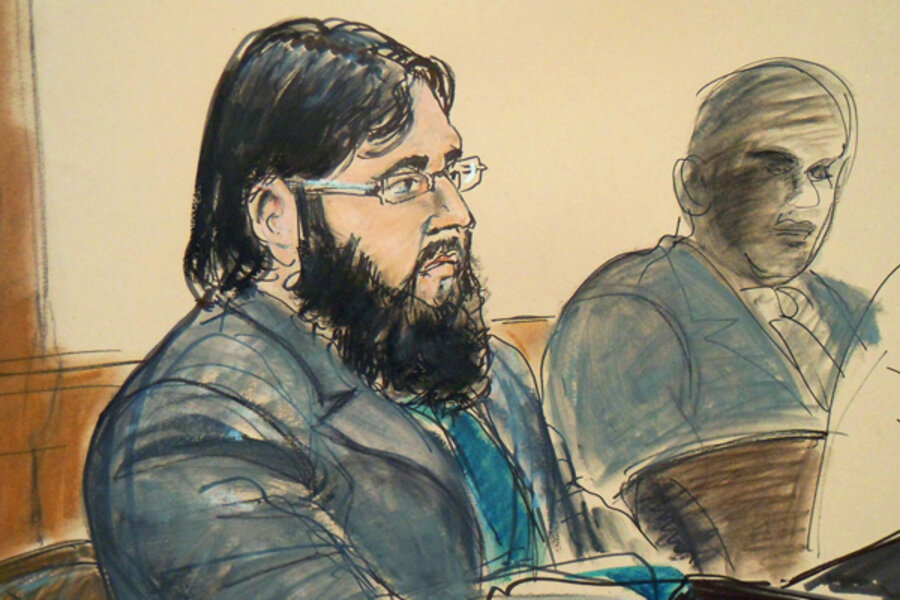New Yorker convicted in plot to bomb subways
Loading...
In what authorities called the most serious terror threat since the Sept. 11, 2001 attacks, a New York City man was convicted Tuesday of plotting with two of his former classmates at a Queens high school to attack the subways as suicide bombers.
A jury deliberated less than two days before finding Adis Medunjanin guilty of conspiracy to use weapons of mass destruction, attempting to commit an act of terrorism and other terrorism charges. At trial, the jurors had heard the first-time testimony from admitted homegrown terrorists about al-Qaida's determination to strike America on its home turf.
The former classmates, Najibullah Zazi and Zarein Ahmedzay, testified that the three men sought terror training after falling under the influence of inflammatory recordings of U.S.-born extremist cleric Anwar al-Awlaki that they downloaded and listened to on their iPods.
Medunjanin's "journey of radicalization led him from Flushing, Queens to Peshawar, Pakistan, to the brink of a terrorist attack in New York City," U.S. Attorney Loretta Lynch said in a statement. "As this case has proved, working against sophisticated terrorist organizations and against the clock, our law enforcement and intelligence agencies can detect, disrupt and destroy terrorist cells before they strike, saving countless innocent lives."
Medunjanin, 27, showed no emotion as the jury foreman announced the verdict in federal court in Brooklyn. Afterward, the former security guard asked defense attorney Robert Gottlieb to "tell his family to be strong," the lawyer said.
Gottlieb said there would be an appeal. His client faces a possible life term at sentencing on Sept. 7.
The government's case was built on the testimony of Zazi, Ahmedzay and two other men: a British would-be shoe bomber and a man originally from Long Island who gave al-Qaida pointers on how best to attack a Walmart store.
Zazi and Ahmedzay, who testified as part of plea deal, told jurors that the scheme unfolded after the trio traveled to Pakistan in 2008 to avenge the U.S. invasion of Afghanistan.
While receiving terror training at outposts in the South Waziristan region of Pakistan, al-Qaida operatives encouraged the American recruits to return home for a suicide-bombing mission intended to spread panic and cripple the economy. Among the targets considered were New York Stock Exchange, Times Square and Grand Central Terminal, the men testified.
In a later meeting in New York, the plotters decided to strap on bombs and blow themselves up at rush hour on Manhattan subway lines because the transit system is "the heart of everything in New York City," Zazi said.
Zazi told jurors how he learned to extract explosives ingredients from nail polish remover, hydrogen peroxide and other products sold at beauty supply stores. When leaving Pakistan, he relocated to Colorado, where he perfected a homemade detonator in a hotel room and set out for New York City by car around the eighth anniversary of the Sept. 11 attacks.
The plot — financed in part by $50,000 in credit card charges — was abandoned after Zazi noticed that everywhere he drove in New York, a car followed.
"I think law enforcement is on us," he recalled telling Ahmedzay. Later, he said he told Medunjanin in a text message, "We are done."
Defense attorneys had admitted that the Bosnian-born Medunjanin wanted to fight for the Taliban, but they insisted he never agreed to spread death and destruction in the city where his family put down roots.
Medunjanin went overseas to fulfill a "romantic version of jihad. ... His plan and intent was to join the Taliban and stand up for what he believes in," Gottlieb said in his closing. "That was his purpose."
Before trial, the defense had failed to get a judge to bar incriminating post-arrest statements by Medunjanin that his lawyers said were coerced.
According to FBI reports, Medunjanin recounted telling his al-Qaida handlers that "he had prayed but still wasn't sure he was ready to be a martyr," the reports said. He later was sent home on his own, the reports said, to "provide financial support" for the terror network.
He told the agents who interviewed him that they "were like enemy combatants to him," the reports added.
Aside from Zazi and Ahmedzay, two other convicted terrorists were called as witnesses to give a rare glimpse into al-Qaida's training methods and the mindset of its leadership.
In a videotaped deposition made public for the first time during the trial, Saajid Badat recounted a clandestine meeting where Osama bin Laden explained the rationale behind the failed plot for Badat and Richard Reid to attack trans-Atlantic flights with bombs hidden in shoes.
Bin Laden "said the American economy is like a chain," the British man said. "If you break one — one link of the chain — the whole economy will be brought down. So after Sept. 11 attacks, this operation will ruin the aviation industry and in turn the whole economy will come down."
Bryant Neal Vinas, of Patchogue on Long Island, testified that he went to Pakistan in 2007 and later joined al-Qaida forces in an attack against American soldiers.
Vinas described how he suggested to others in al-Qaida in the summer of 2008 that they could plant explosives in suitcase aboard a Long Island Rail Road train or hide them inside a television that was being returned to a Walmart.
An attack on the popular retail outlet "would cause a very big economy hit," he said.







